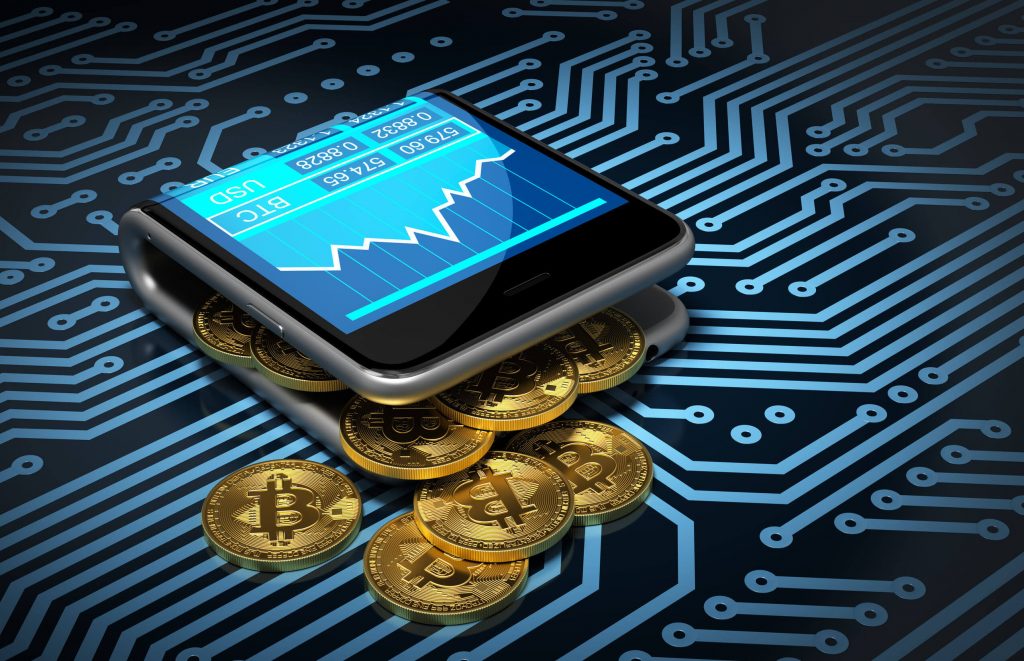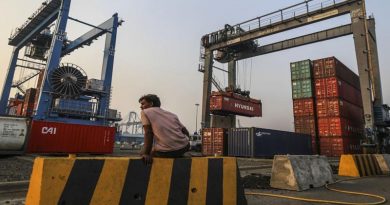Sri Lankans wary over cryptos but welcome blockchain
By Azhar Razak
Sri Lankans should be cautious over cryptocurrencies like bitcoin which underwent a massive volatile bout in price last year but the island should however welcome the adoption of the more beneficial blockchain technologies, local ICT experts say. According to them, blockchain technology is secure and can be used for a wide variety of applications, like block chain-based payments in banks, international trade, land registrations and any other services that requires an agreement with multiple parties.
“In blockchain, data is stored in multiple locations and altering one location does not achieve a hacker’s objective. So security wise, blockchain is quite good,” an expert connected to the Financial Services industry, said.
 Blockchain technology was popularised by the Bitcoin digital currency system in which financial transfers are stored cryptographically. However, a blockchain is a kind of database which can store any kind of data and run a computer code called “smart contracts”.
Blockchain technology was popularised by the Bitcoin digital currency system in which financial transfers are stored cryptographically. However, a blockchain is a kind of database which can store any kind of data and run a computer code called “smart contracts”.
“Using blockchain as a technology, people have started building various solutions including blockchain-based payment like cryptocurrencies being only one of them. But, if you take the way we do payments which is through a distributed trusted ledger, this can also be done through blockchain,” the expert who did not wish to be identified said.
He explained that in blockchain , when a transaction between two people are done, both the records are updated real time as it takes place and therefore there is no reconciliation required either between the two connected parties or by an intermediary.
“Technologies have evolved to a point of distributed trusted network essentially meaning that you can have sources of records of truths recorded amongst many computers and many servers. As a result, the security of blockchain is quite high,” the official pointed out.
He further added that the cryptocurrency like Bitcoin for instance is only one amongst many solutions that has been built on the blockchain technology. Since values of Bitcoins has artificially gone up and down, there have been loads of cryptocurrencies that have come up though not all are blockchain-based, he said.
It is learnt that the Central Bank of Sri Lanka (CBSL) in 2017 have appointed two research committees to study the potential suitability and practicality of the application of Fintech and Blockchain technologies in the local context. The final reports of the committees are due be submitted in two months, informed sources said.
Meanwhile, an ICTA official also recommended the government to explore the use of blockchain technology for securing data and storing personal records adding that these were already being used by a few Sri Lankan companies.
“Maybe the government should try it out it for secured data storage in verticals like healthcare and for storing legal records since it ensures high data protection”, the official noted.
Going a step further, the official said that since cryptocurrency is fast gaining popularity in other countries, Sri Lanka should from now on study the subject seriously so that island could ready with its own framework when more and more countries start adopting it.
“We should not wait till a stage where countries like Dubai and Singapore start adopting it in future and cryptos become like a US Dollar in the long run but be more proactive. If we do that then we will be starting to change regulations at that point and miss the bus,” the official further pointed out.
Understanding cryptocurrencies from a Sri Lankan perspective
There is no doubt that the buzzword and frenzy these days in the corporate world is ‘cryptocurrencies’. And for someone who has an iota of knowledge of this virtual currency, the words ‘Bitcoin’ and ‘Blockchain’ instantly strike their mind.
However, despite the world having evolved from the barter system of trading then, to Bitcoins today, for Sri Lankans and a majority of the world population for that matter, the mechanism of this nascent technology is by and large, still mysterious. Therefore, it is important for Sri Lankans to gain a general understanding on the subject given that the world is increasingly moving towards adopting these technologies.
What is a cryptocurrency?
A cryptocurrency is a digital currency created and transferred online. Unlike Rupees or Dollars, cryptocurrencies aren’t physically printed by a Monetary Authority like the Central Bank but produced by people, and increasingly businesses, running supercomputers all around the world using software called Blockchain that is used to solve mathematical problems.
It is designed to work as a medium of exchange that uses cryptography to secure its transactions both to control the creation of additional units and to verify the transfer of assets.
As cryptocurrencies use decentralized control as opposed to centralized electronic money and central banking systems, it allows users to transact anonymously and securely without the need for financial institutions such as banks to be involved in transactions. As no single institution controls the cryptocurrency network, this puts some people at ease, because it means that banks or regulators do not have control over their money.
Globally, there are hundreds of cryptocurrencies, some of which have grown in value and awareness while others are even potential scams or a waste of money.
According to experts, cryptocurrencies are leading a new wave of Internet application development, which many believe will ultimately form the backbone of a large proportion of the Internet over the coming years.
“This decentralized mode of exchange though in the early stages of development, has the unique potential to challenge existing systems of currency and payments,” an official from Information and Communication Technology Agency (ICTA), Sri Lanka’s apex ICT institution of the government, said.
Bitcoin
The world’s first cryptocurrency was named Bitcoin. It was invented in the year 2009 by a software developer who carried a pseudo name, Satoshi Nakamoto. His idea was to produce a currency independent of any central authority, transferable electronically, more or less instantly, with very low transaction fees.
At the time of invention of bitcoin, Nakamoto had already invented the Blockchain software, a technology that is essential to run cryptocurrencies like bitcoin.
Bitcoin is today the world’s most popular and the leading coin by market capitalization. Bitcoin was developed and released with an open-source license in 2009 which meant that the technology was open for continuous development and improvement by its users. Since then, numerous other cryptocurrencies have evolved. Coins which are not Bitcoin are generally called Altcoins. The most notable of these are Ripple, Dash, Litecoin and Ethereum.
Like conventional currencies traded digitally, bitcoin can be used to buy products and services electronically. However, at present, there are very limited retailers around the globe who accept payments through Bitcoins.
Moreover, as the value of the coin fluctuates, people have been using it as an investment product like a share purchase and therefore this entails a combination of risk and return.
Bitcoin’s legal status in Sri Lanka
The rapid emergence of Bitcoins and the cryptocurrency market in general has challenged the legacy of fiat currency creating a revolutionary phenomenon that cannot be ignored. While some countries have started experimenting with it, and supporting it after due diligence and regularization, most South Asian countries, including Sri Lanka have taken a ‘wait and watch’ approach. However, it is learnt that research on the subject is already taking place by Sri Lanka’s Monetary Authority.
“The Central Bank of Sri Lanka has appointed two committees. One has been tasked to study ‘Blockchain’ which includes cryptocurrencies and the other to study ‘Fintech’. The final reports are due in two months time,” an informed source said.
Accordingly, it is learnt that the Central Bank will announce the country’s position on cryptocurrencies following submission of the two said reports and after obtaining legal clearance.
“There have been many interested parties from Sri Lanka. The Central Bank is looking at certain legal barriers and to see how it could regulate these emerging technologies,” the source who wished to remain anonymous said.

Legality in other countries
Outside of Sri Lanka, the legal status of cryptocurrencies varies substantially from country to country and is still undefined or changing in many of them. While some countries have explicitly allowed their use and trade, others have banned or restricted it. Likewise, various government agencies, departments, and courts have classified bitcoins differently.
Bitcoin has been legalized in many of the developed countries such as United States, United Kingdom, Canada, Australia, New Zealand while countries in both the South East Asian and South Asian regions have taken a cautious approach.
The Chinese banned the handling of bitcoins by financial institutions in China during an extremely fast adoption period in early 2014. On the other hand, the Reserve Bank of India has announced that bitcoin is not a legal tender and added that it has not given any authorisation to any entity to operate such schemes or deal with bitcoin or any virtual currency.
In Russia, though cryptocurrencies are legal, it is illegal to actually purchase goods with any currency other than the Russian ruble.
“In some countries, Bitcoins have not been declared illegal only because the governments still do not know how to regulate it by taxing the transactions earning revenue from it. Therefore, they have not declared any specific regulation for it,” an expert on the subject told the Sunday Observer.
On the other hand, another technology expert said that governments cannot totally ban bitcoins because even if a government does it, it will still be available in the owner’s electronic wallet.
“It is like a peer to peer money transfer system and the whole idea of its creation is its anonymity and there is no one who controls it,” the expert noted.
Accordingly, as cryptocurrency is pseudonymous and not tied to people (tied to one or more specific keys or ‘addresses’ such as email addresses), cryptocurrency owners are not identifiable although all transactions are publicly available in the blockchain.
How are bitcoins accumulated?
Bitcoins are ‘mined’ using computing power in a distributed network. This network also processes transactions made with the virtual currency, effectively making bitcoin its own payment network.
The bitcoin protocol which lays down the rules that make bitcoin work says that only 21 million bitcoins can ever be created by miners. However, these coins can be divided into smaller parts with the smallest divisible amount being one hundred millionth of a bitcoin. This is called a ‘Satoshi’ named after the founder of bitcoin.
“The use of energy accounts for between 90% to 95% of bitcoin mining costs and plays an extremely critical role in determining price and profitability for the cryptocurrency’s miners.
“Since these resources are scare, the difference in its cost of production and overall value will become unviable, unless the mining process becomes more energy-efficient,” another commented.
Risks of volatility in prices
The price of Bitcoin can change drastically as countries and financial institutions adapt to the idea of cryptocurrency. Hence, financial experts have discouraged people to buy and trade with bitcoin due to its incredible volatility. Research suggests that most of them are of the opinion it is a bubble ready to burst.
“In terms of cryptocurrencies, generally, I can say with almost certainty that they will come to a bad ending,” US billionaire investor, Warren Buffett had warned in a television interview with CNBC.
In 2017, Bitcoin’s value soared from $1,000 to just under $20,000 before dropping down to around $13,000 at the end of the year. Since then, its value has risen and dropped sporadically from day to day, dragging smaller cryptocurrencies like Ether and Ripple along with it.
“Unlike other types of investments, like stocks or gold, Bitcoin trading never stops, either. There are no market hours. Instead, you get non-stop 24/7 trading, which means even more fluctuations in Bitcoin’s value and less stability day-to-day,” the experts pointed out.
According to www.coinmarketcap.com which tracks the prices and market capitalization of around 1476 cryptocurrencies, Bitcoin’s price as at 23rd January 2018, is leading at US$ 10,279 while the market capitalization is at US $174 billion. The entire cryptocurrency market as at that date showed a figure of over US $496 billion.
Experts say that price stability could only be ensured if more people start buying the currency and governments begin to fully regulate the industry. Until then, the volatility of cryptocurrencies will not subside and any investment made in the short term will be similar to the levels of risk taken while gambling in a casino.





